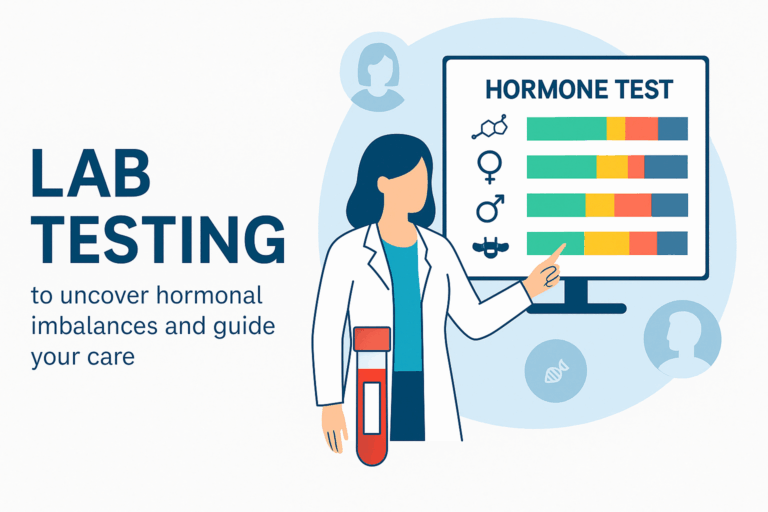- DISADMIN
- 0 Comments

Who Really Needs Hormone Replacement Therapy? Understanding When It’s Time to Check Your Levels
Hormone Replacement Therapy can be life-changing for both men and women. If you’ve been wondering who really needs hormone replacement therapy and when to test your levels, this guide will walk you through everything you need to know, from symptoms to lab testing and integrative care.
Let’s clear that up.
Hormones play a massive role in how your body functions every single day. They influence your energy, mood, muscle strength, focus, sleep, and even how well your metabolism runs. When hormones fall out of balance, life can start feeling a little off. The good news is, with the right testing and care, you can catch those changes early and get back to feeling like yourself again.
The Truth About Hormonal Changes
For both men and women, hormone levels shift naturally over time. These changes can begin earlier than most people think.
For men, testosterone levels start declining gradually after age 30, often dropping about 1% per year. That may not sound like much, but over time it adds up. Low testosterone can lead to fatigue, decreased muscle tone, stubborn weight gain, brain fog, low libido, or mood changes.
For women, hormone shifts tend to be more sudden. Estrogen and progesterone begin to fluctuate in the years leading up to menopause (known as perimenopause), and symptoms like hot flashes, poor sleep, mood swings, weight gain, and irregular periods often show up. After menopause, when estrogen levels drop sharply, these symptoms can intensify.
But here’s the important part, hormonal imbalance doesn’t only affect people in their 40s or 50s. Stress, poor sleep, nutrient deficiencies, certain medications, or underlying conditions can cause hormone disruption at any age. Before starting hormone replacement therapy, lab testing is essential.
How to Know if You Should Get Tested
Sometimes the signs of hormone imbalance can be subtle. It’s easy to brush them off as “just getting older” or “being tired from work.” But if you start noticing patterns that don’t improve even after adjusting your diet or sleep, it’s time to look deeper.
Common symptoms that may indicate hormone imbalance include:
Low energy and constant fatigue
Unexplained weight gain or difficulty losing weight
Brain fog or trouble concentrating
Reduced strength or muscle recovery
Low libido or changes in sexual function
Sleep issues, including insomnia
Mood changes, anxiety, or irritability
Hot flashes or night sweats
Thinning hair or skin changes
If you see yourself in several of those, hormone testing can provide real answers instead of guessing.
When Should You Test Your Hormones?
Hormone testing isn’t something you do just once. Levels fluctuate naturally, and monitoring helps track how your body is responding to therapy or lifestyle changes. Based on current integrative guidelines and hormone management best practices, here’s a good schedule to follow:
Initial Baseline: Before starting HRT or TRT, always get a full hormone panel. This provides a clear picture of your current levels and helps guide treatment.
6–8 Weeks After Starting or Changing Dose: Hormones take time to stabilize, and early follow-up testing helps ensure you’re responding well to the dosage.
Every 3–6 Months During the First Year: This period is all about fine-tuning. Regular testing ensures balance and minimizes unwanted side effects.
Every 6–12 Months for Long-Term Maintenance: Once your levels are stable, testing once or twice per year keeps everything in check.
Yearly Complete Labs Regardless: Even if everything feels perfect, a yearly full lab panel (including thyroid, liver, kidney, and lipid markers) helps maintain a complete view of your overall health.
All of these labs can be easily ordered through Discount TRT Labs, which partners with LabCorp and Quest Diagnostics for convenience and accuracy. You can self-order, skip the doctor visit, and get results quickly and affordably.
For Men: Signs It May Be Time for TRT
For men, testosterone is more than just a “male hormone.” It helps regulate metabolism, bone density, mood, and cardiovascular health. Low testosterone, also known as hypogonadism, is becoming increasingly common, even among younger men in their 30s and 40s.
Some men first notice changes in motivation or recovery after workouts. Others realize they no longer have the same drive or energy they once did. If your bloodwork shows consistently low total or free testosterone, TRT might be worth considering.
TRT can help improve:
Energy and mental clarity
Muscle mass and strength
Mood and confidence
Sleep quality
Sexual health and libido
Of course, the goal isn’t to push testosterone too high. It’s about restoring your natural balance safely. Working with a provider familiar with integrative and functional approaches can help ensure all hormones — not just testosterone — are optimized, including DHEA, cortisol, and thyroid function.
For many men, hormone replacement therapy helps restore energy, mood, and motivation.
For Women: Why HRT Can Be Life-Changing
For women, estrogen and progesterone are the backbone of physical and emotional well-being. When these hormones decline, the body feels the difference almost immediately.
Perimenopause and menopause can trigger a variety of symptoms, such as:
Hot flashes and night sweats
Weight gain, especially around the abdomen
Low libido or vaginal dryness
Irritability and mood swings
Sleep problems
Fatigue or brain fog
HRT can make a major difference in how women feel day to day. Restoring hormone balance may improve sleep, energy, skin, bone density, and overall quality of life. Some women also benefit from adding small amounts of testosterone or DHEA for strength and focus.
Integrative care is especially important here. While HRT can be highly effective, the foundation should still include nutrition, exercise, and liver support to help the body metabolize hormones properly.
Women often find hormone replacement therapy improves sleep, skin health, and emotional balance.
The Integrative Approach: Why Balance Matters
Whether you’re using HRT or simply exploring your options, hormone balance is about more than one lab number. Your body’s hormone system works like a symphony — testosterone, estrogen, progesterone, thyroid, and cortisol all interact.
That’s why functional and integrative testing often includes a more complete view of your health. For example, a full men’s or women’s hormone panel from Discount TRT Labs doesn’t just measure sex hormones. It can also assess inflammation, metabolic function, nutrient markers, and more.
This broader approach helps identify why hormones are off in the first place. For some people, stress and adrenal fatigue play a big role. For others, nutrient deficiencies or environmental toxins are the real trigger. The goal is not just to replace hormones, but to support the systems that regulate them naturally.
When to Seek Professional Guidance
Hormone replacement is not one-size-fits-all. It requires thoughtful testing, personalized planning, and ongoing monitoring. If you’re considering HRT or TRT, look for a provider who:
Orders comprehensive baseline labs before prescribing
Reviews your full medical history and symptoms
Explains all options, including bioidentical or compounded therapies
Re-tests regularly to ensure balance
Encourages lifestyle changes alongside treatment
At Mindful Objective, we focus on helping clients uncover the root causes behind their symptoms and design protocols that restore long-term balance. That includes nutrition strategies, foundational supplements, and personalized lab panels that can be ordered through Discount TRT Labs.
The Integrative Health Connection
At Mindful Objective Integrative Health & Wellness, we believe hormone balance should never be viewed in isolation. Nutrition, stress levels, and gut health all influence how hormones behave. Supporting these systems ensures that HRT or TRT produces long-term results rather than temporary relief.
Our approach includes:
Foundational supplements to promote hormone metabolism and cellular repair
Functional lab testing to uncover nutrient deficiencies or toxic burdens
Personalized nutrition guidance for blood sugar stability and weight management
Lifestyle strategies to improve sleep, focus, and energy naturally
Hormones do not operate alone. They respond to what’s happening in your environment, your stress levels, and your daily habits. Integrative care bridges the gap between traditional medicine and natural support.
Why Quality Supplements Matter
When restoring balance, the supplements you choose can make a big difference. Not all products are created equal. At Mindful Objective, we only recommend third-party-vetted, professional-grade supplements available through our Fullscript store at 20% off retail pricing.
These supplements are tested for purity, potency, and ingredient accuracy, meaning what’s on the label is actually what’s in the bottle. Many over-the-counter supplements don’t meet that standard. By using professional-grade options, you ensure consistent results without fillers or contaminants that can interfere with hormone function.
Clients can easily access foundational protocols for hormone balance, liver detoxification, and adrenal support directly from the Mindful Objective online store. It’s a practical, affordable way to start building health from the inside out.
Learn More Through the Mindful Objective Podcast
If you want to explore hormone health in more depth, tune into the Mindful Objective Podcast, streaming on all major platforms. Each episode dives into real-world topics like hormone balance, weight loss resistance, inflammation, gut health, and functional testing.
The podcast blends science with everyday experience, offering practical steps anyone can follow. You’ll hear real stories, evidence-based strategies, and conversations that connect the dots between nutrition, lifestyle, and optimal health.
For those considering HRT or TRT, several episodes break down how hormones interact with metabolism, sleep, and mood, giving you clarity before making any decisions.
Final Thoughts
Hormone replacement therapy isn’t about chasing youth, it’s about restoring function, vitality, and balance. When done correctly, it can help both men and women feel sharper, stronger, and more stable.
If you’ve been struggling with low energy, poor sleep, or mood swings, it might be time to test your hormones and see what’s really going on.
Start with a baseline lab through LabCorp or Quest via DiscountTRTLabs.com. From there, you’ll know exactly where you stand and can make informed decisions about your health.
Because feeling your best isn’t about guessing. It’s about testing, understanding, and supporting your body with care that lasts.
